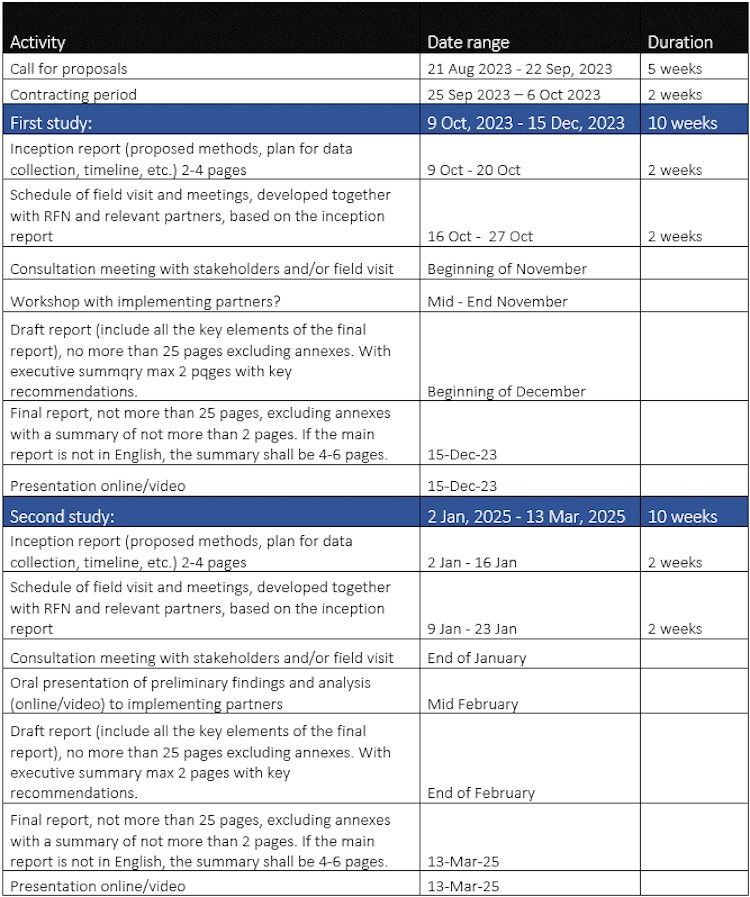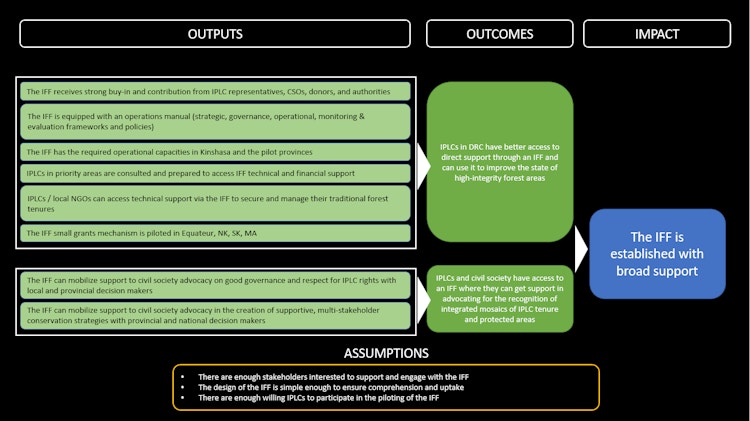Terms of Reference
Real-time evaluation of the Indigenous Peoples and Local Communities (IPLC) Forest Facility (IFF) in the Democratic Republic of Congo, carried out by Rainforest Foundation Norway
Background:
The Indigenous Peoples and Local Communities (IPLC) Forest Facility (IFF) is a project implemented by Rainforest Foundation Norway (RFN), designed as a unique innovation to enable greater engagement by civil society and IPLCs in forest management and forest governance on the provincial/jurisdictional level. RFN is an organization specialized in rainforest protection and IPLC rights. With experience from all rainforest regions, an extensive network of partners and allies, and a focused global policy program, RFN provides a unique experience base and is positioned to make a difference. In this project, RFN is taking on the role of “incubator” for the establishment of the IFF and plans to empower the Facility sufficiently to eventually become an independent mechanism, designed with the consultation of IPLCs, and managed in-country.
The creation of an IFF will address two urgent, parallel needs: 1) the need for special measures to conserve the remaining tracts of large high-integrity forests1 and 2) the need for land tenure regimes, spatial planning and development interventions to support IPLCs.
To ensure long-term security for DRC’s forests, and to strengthen the role of communities in forest governance, the IFF will primarily support the establishment of effective, equitable, rights-based management regimes for high-integrity forests. The facility will focus on creating integrated mosaics of Indigenous/community land tenure and protected areas, recognized and supported in government-endorsed spatial and jurisdictional plans. To achieve large-scale impacts, direct financial and technical support is needed for this core set of approaches in and around each high integrity forest area. The project recognizes the need to protect high-integrity forests at relatively large ecosystem and landscape scales, which encompass a mosaic of land types and uses and requires working with a diverse range of communities and stakeholders.
With an emphasis on complementing and adding value to existing REDD+ and conservation programmes, the IFF will use small grants to support clusters of community-based activities that are intended to strengthen preservation of high-integrity forests and to enhance local development. The decentralized structure of the IFF will encourage maximum community-level ownership, and initiative. IFF’s financial support will be both direct and flexible to support IPLCs, community-based organizations and CSOs and research institutes. The IFF’s grant mechanisms will prioritize provision of financial support to groups that are usually unable to receive funding from existing donors.
To ensure success, investment is also needed to support greater civil society involvement in establishing four key enabling conditions:
1. Good governance and systematic respect for the rights of all individuals.
2. The creation of supportive, multi-stakeholder conservation strategies.
3. Reduction of threats due to economic drivers (e.g. commodity supply chains, infrastructure).
4. Investment in ‘green economy’ alternative development pathways.
In practical terms the IFF would support the following activities:
- Direct assistance (funding, capacity building, technical advice) to projects of IPLC groups and local organizations in community-based rainforest management, covering establishment, development and implementation of simple management plans of CFCLs, the development of economic activities, and collaborations between communities.
- Strengthening the involvement of IPLCs in protected area management, including the benefits of protected areas as ‘regional anchors’ for sustainable development and better governance.
- Technical support enabling civil society to engage more effectively on land-use planning and decision-making with provincial and national authorities and administrations, as well as REDD+ implementing agencies and private sector actors.
- Activities could potentially include climate payments to communities managing their forests successfully, depending on national policy developments.
The vision of the project is that eventually, the IFF will become independent and appropriated by the IFF Secretariat in Kinshasa. In order to establish an IFF which functions effectively and in the long-term for the activities above, there has to be local buy-in and uptake. One risk in the planning stage of the project is that the design process for the Facility is not participative enough or doesn’t sufficiently consult local stakeholders who will be the main users. If RFN wants to eventually phase out its involvement after the incubation stage (Feb 2022 – Sep 2025) and achieve the establishment of a durable, independent Facility, special attention needs to be given to the strategy for including stakeholders in the design process and empowering the IFF beyond the project period. This should be the underlying theme of all parts of the evaluation.
Purpose:
The purpose of this real-time evaluation is to produce knowledge that can improve the establishment, implementation, empowerment and sustainability of the IFF, especially examining the participatory approach throughout these milestone periods. Lessons learned and recommendations from the evaluation should also help guide and inspire similar interventions around the world. Each of the studies will cover specific aspects of the evaluation’s purpose:
- The first study will serve to improve documentation of the results and effects of this project as well as the project’s participatory strategy to ensure the IFF’s empowerment and independence.
- The second study, will assess the early implementation of the project and generate recommendations to improve implementation in the remaining period, providing input to the design of the IFF’s governance and independent M&E systems, as well as the implementation of activities by partners and the piloting of the small-grants mechanism. Lessons learned for future use within the IFF and beyond should be highlighted. Key issues for project implementation and final evaluation will be identified.
Evaluation use and users:
The two studies will be used by RFN, the IFF staff based in Kinshasa, and the implementing partners to adjust course and improve implementation throughout the project. The second study will include recommendations to a wider audience consisting of organisations working in similar fields.
Objectives:
STUDY 1:
Relevance and Coherence (OECD DAC Evaluation Criteria)
Relevance in this project context refers to the extent to which the objectives and design of the IFF respond to the needs of its users in Equator, North Kivu, South Kivu, and Maneima, within the context of protecting large, high-integrity rainforest areas.
Coherence refers to the compatibility of the IFF with other interventions in DRC (especially Integrated REDD+ Programs (PIREDD), as well as global initiatives such as the Shandia Platform.
Primarily a formative evaluation, this study will provide a basic assessment of the project’s design and set-up, the theory of change, and the monitoring & evaluation system, with a special focus on the participatory approach to the IFF’s design, RFN’s involvement in its incubation and plans for the empowerment/independence of the IFF. Part of the final report for this study would contribute to the empowerment plan, which is to be a part of the operations manual of the IFF.
STUDY 2:
Effectiveness and Sustainability (OECD DAC Evaluation Criteria)
Effectiveness in this project context refers to the extent to which the project achieved, or is expected to achieve, the outcomes laid out in the results framework, by looking at the early implementation of the piloting phase.
Sustainability refers to the extent to which the IFF is likely to function and achieve enough local buy-in to continue independently after the incubation period and the phasing out of RFN involvement.
This study will assess the state of project implementation compared to the original plans, and in the case of deviations suggest amendments (in plan/design or implementation). It will also contribute directly to the revision of the operations manual, identify issues that deserve extra attention during the remaining project period, and provide recommendations on the sustainability of the Facility. Lessons learned should be presented in a way that enables similar facilities in other regions to improve their implementation as well.
Further refinement of objectives and formulation of specific evaluation questions will be done in preparation for each study, in cooperation with the evaluation team.
Evaluation questions:
STUDY 1
(detailed questions can be developed as part of the inception phase)
Review of the Theory of Change: Assess the relevance and coherence of the explicit (and implicit) theories of change for the project, establishing the IFF in DRC. Provide recommendations to ensure continuous reflection and learning. (RELEVANCE and COHERENCE)
Review the monitoring and evaluation system for the establishment of the IFF:
- Assess the planning processes underlying the interventions and the monitoring and evaluation system, provide recommendations for improvements to measure impact and ensure that the outcomes are met. (RELEVANCE)
- Review the LogFrame and provide recommendations for improvements to its structure and indicators. (RELEVANCE)
Cross-cutting issues: Review the integration of gender and age aspects, human rights and anti-corruption in the project and provide recommendations to project design. (RELEVANCE)
Institutional roles and capacity:
- Is RFN’s role in the establishment of the facility clearly delineated? Give recommendations for strengthening added value. (RELEVANCE and COHERENCE)
- Is the strategy for the establishment of the IFF and plans for its empowerment and the phase out of RFN’s incubation participatory and robust enough to ensure local buy-in and appropriation? Create an empowerment plan for the IFF, using findings and recommendations from this question. (RELEVANCE)
- Do the implementing partners have the right capacities and configurations to implement their aspects of the IFF program? (RELEVANCE)
STUDY 2
(detailed questions can be developed as part of the inception phase)
Governance system of the IFF: Review and provide recommendations to improve structure and operations manual of the IFF. (EFFECTIVENESS)
Implementation by Partners: Review the implementation of “readiness activities” as well as “enabling activities” by partners. (EFFECTIVENESS)
Implementation of small-grants piloting: Review the small grants mechanism being piloted in the targeted provinces and provide recommendations for the eventual piloting of the mechanism elsewhere. (EFFECTIVENESS)
Impact and Sustainability: Summary of lessons learned and recommendations for the sustainability of the facility beyond the incubation phase. (SUSTAINABILITY)
Scope:
The evaluation object is the establishment of the IPLC Intact Forest Facility of DRC. This includes all relevant documents, the implementing organizations and key stakeholders. The main geographical regions for the project are Equateur, North Kivu, South Kivu, and Maniema.
Method:
The evaluation will be based on recognized evaluation methods, predominantly qualitative. Emphasis will be put on the possibility for representatives of all stakeholders, in particular target groups and marginalized groups, to provide information and share their views freely, and to comment on preliminary analyses and draft reports. Specific methods and a more elaborate evaluation design will be suggested by the evaluation team and approved by RFN in preparation for each study. Inception reports and draft reports should be prepared in French. The final reports should be translated to English. In the aim of efficiency and ease of liaising with the stakeholders, it will be necessary that the selected consultant can communicate in both English and French.
Deliverables and suggested timeline:

Timeline summary:
First Study: 2023 (10 weeks)
Second Study: 2025 (10 weeks)
Organization of the evaluation:
The evaluation will be organized under one overall contract, to be supplemented with addendums specifying details for each study.
IFF Project Result Framework
